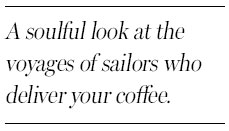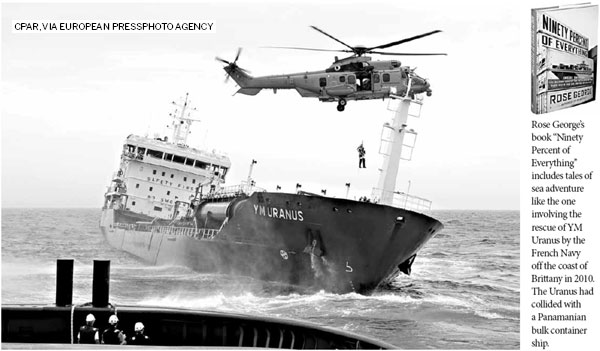In the spooky world of global shipping
Updated: 2013-11-03 08:12
By Dwight Garner(The New York Times)
|
|||||||||
Rose George is a young British journalist who writes smart books about subjects we mostly prefer not to think about. Her last one, "The Big Necessity" (2008), about human waste and society, is among the best nonfiction books of the new millennium.
"Ninety Percent of Everything," her new one, is a timely and deft look at shipping, and thus globalization.
In part, "Ninety Percent of Everything" is an adventure story. Ms. George is permitted to catch a ride on a giant container ship, the Maersk Kendal. It carries her from the "southern English port of Felixstowe to Singapore, for five weeks and 9,288 nautical miles through the pillars of Hercules, pirate waters, and weather."
The Maersk Kendal is a relatively new ship, yet life onboard is ascetic. There is no Internet. Cellphones don't work. Alcohol is not permitted. The lighting is industrial, the food grim. The crew has no idea what is in the containers being hauled.
Ms. George wants to cure herself, and us, of what the chief of the British Navy has called "sea-blindness." The sea is something we fly over now. We rarely stop to think about the millions of who work aboard these ships.
This soulful writer is a moralist. "Buy your fair-trade coffee beans by all means," she says, "but don't assume fair-trade principles govern the conditions of the men who fetch it to you."
Ms. George is shrewd on the economies of scale at work in global shipping. Her book is replete with facts that will make you slowly rub your forehead. "Shipping is so cheap that it makes more financial sense for Scottish cod to be sent 10,000 miles to China to be filleted, then sent back to Scottish shops and restaurants, than to pay Scottish filleters," she writes.
This book frequently broadcasts an alien, spooky glow. The ship she is aboard is immense, for example, but is staffed by only 20 people. (The chef, Pinky, is the only other female aboard.) The rattling and humming get to the author. "It is rare that I wake up without having dreamed a murder," she writes. "The crew nods with recognition when I tell them this."
The ocean itself is indifferent, implacable, deadly. Ms. George notes that 2,000 seafarers die at sea each year, and more than two ships are lost each week. These events do not make the evening news. As a man who lost his brother at sea says to her, "If it had been airplane safety, something would have been done about it."

The ocean is a wild, mostly lawless place. As one mariner comments, "There are no skid marks on the ocean." When an accident does occur, it can be difficult to seek even meager justice. There is no police force or union official to assist," the author says. "Who do you complain to, when you are employed by a Manila manning agency on a ship owned by an American, flagged by Panama, managed by a Cypriot, in international waters?"
Ms. George lets her mind play over many aspects of shipping in her book. We read about the invention of large containers, known as TEUs. She reflects on how the Suez Canal is known as the Marlboro Canal because for smooth passage "every ship's captain has to have a ready stock" of the cigarettes to dispense, she says, naming "Immigration, port health, police, security guards." She writes about fuel consumption, about ports, about navigation, about noise pollution and its deleterious effect on whales. She tells the stories of many men and their families.
"Ninety Percent of Everything" is consistently absorbing, and there are moments when its pulse quickens: tales of survival in open boats; others are about rescues and old codes of conduct that still apply.
The most engrossing sections are about pirates, so many of them coming out of Somalia, young men, optionless, chewing khat to get them high and dull their fear. Ms. George spends a week on a Portuguese frigate patrolling for pirates. Many boats have armed guards now, or panic rooms. The best panic rooms work well. "A poorly designed one," she remarks, "can
become a tomb."
Ms. George tells the stories of some recent hijackings at sea, and interviews a maritime hostage negotiator. hese events can drag on for months and sometimes years. "Sometimes, for fun, I ask friends and acquaintances - educated, sophisticated ones - how many hostages they think are being held by pirates," she writes. "Usually they suggest a dozen, when it is often 40 times that."
Ultimately, the author's words ring in your ears. She asks, "Who cares about the men who steered your breakfast cereal through winter storms?" She declares, "How ironic that the more ships have grown in size and consequence, the less space they take up in our imagination."

(China Daily 11/03/2013 page12)